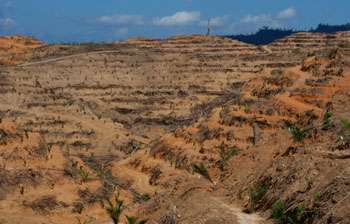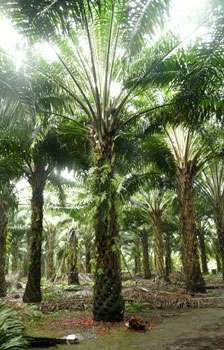High-yielding crops are a double-edged sword for tropical forests

Improving crop yields is often seen as a popular solution to the increasing demand for food productivity to meet the needs of a growing global population, because food demand can be met over the smallest land area possible, saving forests from conversion.
However, contrary to these expectations, a team of leading international scientists, headed by Dr David Edwards from the University of Sheffield, has warned that using high-yielding oil palm crops will simply transfer the agricultural footprint from areas such as North America and Europe to the bio diverse tropical rainforests of Southeast Asia, South America and Africa.
Dr David Edwards, from the University of Sheffield's Department of Animal and Plant Sciences, said: "In theory yielding twice as much crop on the same amount of land should be a positive thing because it can reduce demand for further forest clearance.
"However, using high-yielding oil palm crops could in fact lead to further tropical deforestation because it becomes so cheap on the global food markets that it outcompetes alternatives grown in temperate regions."
He added: "This means there would be more demand to plant oil palm in threatened rainforests where there is a hugely diverse range of wildlife and plant species, in favour of crops grown in places such as Canada, which retains much forests and far less wildlife diversity.
"This means we would simply be transferring our agricultural footprint from higher latitudes, where farmers would likely go out of business in the absence of subsidies, to tropical areas where the impact on diverse wildlife and plant species would be extremely damaging.

"On the other hand, new varieties of oil palm also compete with crops such as soybean which could mean that land is spared in other tropical countries such as Brazil."
Cecilia Larrosa, author in the study comments: "Oil palm, which is used in a huge number of household items including shampoo, soap, margarine and chocolate, is already one of the main drivers of deforestation in the tropical rainforests of Southeast Asia."
New high-yielding crop varieties are likely to lead to further conversion in Asia, but also to open the door to massive conversion in Africa and Latin America, where the suitable temperatures and rainfall could see farmers more than double their crop production.
Members of the research team from Sheffield, Imperial College London and the National University of Singapore, urge scientists to help governments to pre-empt and plan for the unintended negative consequences of technical advances in crop production.
Lead author, Dr Roman Carrasco from the National University of Singapore, said: "We need an urgent international response from producer and consumer nations to ensure that the benefits of increased yields are realised in tropical nations and prevent an even greater extinction crisis."
Professor E.J. Milner-Gulland of Imperial College London added: "It's really important that when we consider the potential of new technologies we look beyond their immediate impacts. In the case of palm oil, market changes brought on by these new varieties could lead to dramatic deforestation in some of the most biodiverse parts of the planet."
Provided by University of Sheffield


















